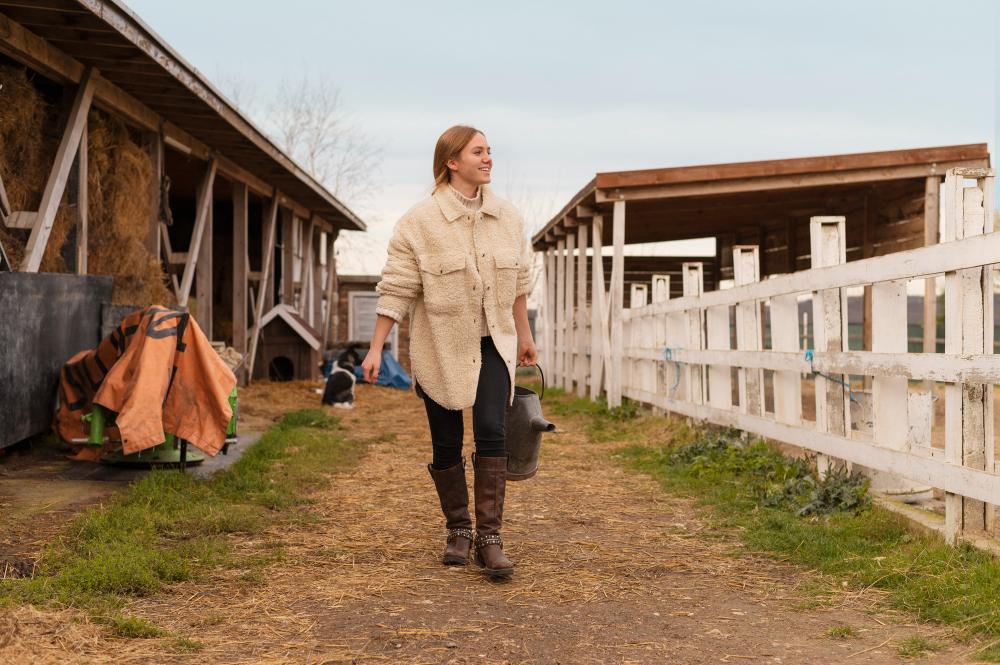If you think your barn is overstuffed with different items, then chances are, it IS overstuffed. You may have stored items in there that should not be kept in a barn.
Barns are often seen as versatile storage spaces, capable of accommodating everything from farming equipment to holiday decorations. Their spacious interiors and rustic charm make them an attractive option for homeowners and farmers alike.
However, barns are not the ideal storage solution for every item. The open design, fluctuating temperatures, humidity levels, and potential for pest infestations can make certain belongings vulnerable to damage or degradation. To ensure your possessions remain in good condition, it’s crucial to know what not to store in a barn.
Why Barns Are not Suitable for All Items
Barns are primarily constructed for agricultural purposes, prioritizing functionality and durability over refined storage conditions. Unlike modern storage facilities, most barns lack proper insulation and temperature control, leaving them vulnerable to the whims of weather. Intense heat can warp materials, while freezing temperatures can cause certain items to crack or become brittle. Humidity is another major concern, as it fosters an environment where mold, mildew, and rust can thrive. These extremes make barns unsuitable for items that require a stable climate to maintain their integrity over time.
Another issue with barns is their susceptibility to pests. Rodents, insects, and other creatures often make their homes in these structures, chewing through wood, fabrics, or wiring. Pests can destroy valuable items in a short amount of time, leaving them damaged or completely unusable. Beyond pest-related risks, the open or minimally secured nature of many barns can make them an easy target for theft. Without proper locks or monitoring systems, stored belongings may be at a higher risk of being stolen or tampered with.
Given these challenges, it’s crucial to carefully consider what you plan to store in a barn. While they may seem like a convenient solution for extra storage, not all belongings are suited to such an environment. Before committing to storing items in a barn, evaluate whether the space offers adequate protection against environmental damage, pests, and theft. Understanding these risks can help you make informed decisions about how best to preserve your possessions.
Electronics and Appliances
Electronics and appliances are highly sensitive to environmental factors such as temperature fluctuations, humidity, and dust. Storing items like televisions, computers, and refrigerators in a barn can lead to corrosion of internal components, cracked screens, or electrical failures. Humidity, in particular, can cause condensation to form within electronic devices, leading to short circuits or mold growth on wiring.
If these items are exposed to freezing temperatures, they may experience irreparable damage to internal mechanisms. For example, appliances with liquid components, such as refrigerators, can freeze and cause pipes to burst. Dust, a common issue in barns, can also clog vents and fans, reducing efficiency and lifespan. For these reasons, electronics and appliances are better stored in climate-controlled environments.
Documents and Books
Paper-based items like documents, books, and photographs are highly susceptible to damage in a barn. High humidity levels can cause paper to warp, stick together, or develop mold and mildew. Conversely, overly dry conditions can make paper brittle and prone to tearing. Insects, such as silverfish and termites, are also drawn to paper products and can destroy them in a matter of weeks.
Additionally, barns often lack the proper shelving and storage systems to keep these items safe from dirt and dust. Even sealed containers may not fully protect paper-based items from environmental damage. If you need to store important documents or books, opt for a secure, climate-controlled facility instead.
Clothing and Fabrics
While it might seem convenient to store off-season clothing, bedding, or fabric-based items in a barn, these materials are particularly vulnerable to damage. Humidity can lead to mold and mildew growth, causing irreversible stains and unpleasant odors. Pests like moths and rodents can chew through fabrics, leaving holes and rendering items unusable.
Even sealed storage bags or plastic bins may not provide sufficient protection, as fluctuating temperatures can cause condensation to form inside containers. This creates a damp environment where mold thrives. For long-term storage, consider using vacuum-sealed bags and keeping fabric items in a dry, climate-controlled area.
Artwork and Antiques
Artwork and antiques often hold significant sentimental or monetary value, making proper storage essential. The uncontrolled environment of a barn can be detrimental to these items. Paintings, for example, may crack or fade when exposed to temperature fluctuations and humidity. Wooden antiques can warp, split, or develop mold, while metal components may rust.
Barns are also prone to dust and dirt, which can settle on delicate surfaces and cause abrasions or discoloration. Pests like rodents can chew on wooden furniture or other materials, causing significant damage. If you own valuable artwork or antiques, professional storage solutions with regulated conditions are a safer choice.
Perishable Food Items
Barns may seem like a logical place to store food items, especially for those accustomed to agricultural settings. However, most barns are not equipped to protect perishable food from pests, humidity, or temperature extremes. Rodents, insects, and birds can easily access food storage areas, contaminating or destroying supplies.
Even non-perishable items, such as canned goods or dry grains, can be compromised by moisture or heat. Metal cans may rust, while grains and cereals can become infested with weevils or other pests. To store food safely, use sealed containers in a cool, dry, and pest-free environment.
Flammable or Hazardous Materials
Storing flammable or hazardous materials in a barn is not only unsafe but potentially illegal, depending on local regulations. Items such as gasoline, propane tanks, or chemicals used for farming or household maintenance pose significant risks in a barn setting.
The presence of heat, open flames, or electrical wiring in barns can lead to accidents or fires. Additionally, fumes from these materials can accumulate in enclosed spaces, creating health hazards for humans and animals. Flammable or hazardous materials should be stored in designated, secure locations designed for such purposes.
Delicate Musical Instruments
Musical instruments, particularly those made of wood, are highly sensitive to environmental conditions. Pianos, guitars, violins, and other instruments can warp, crack, or lose their tonal quality when exposed to fluctuating temperatures and humidity. Metal components, such as strings and hardware, are also prone to rust in damp conditions.
The dust and dirt commonly found in barns can settle inside instruments, affecting their sound and functionality. For proper storage, keep musical instruments in temperature- and humidity-controlled environments with protective cases.
Household Furniture
While barns offer ample space for storing furniture, they are far from ideal. Wooden furniture can warp, crack, or become infested with pests like termites or beetles. Upholstered furniture is even more vulnerable, as fabric and padding can harbor mold, mildew, and rodents.
Even metal furniture is not immune to damage, as rust and corrosion can occur in humid or damp conditions. If you need to store furniture, use protective coverings and ensure the storage space is dry and well-ventilated. Better yet, opt for indoor storage facilities specifically designed for household items.
Fragile or Sentimental Items
Items with high sentimental value, such as family heirlooms, collectibles, or delicate decorations, should never be stored in a barn. These items are often irreplaceable, and the risk of damage from environmental factors, pests, or theft is too high.
Fragile items, such as glassware or ceramics, can crack or break if not stored securely. Dust, dirt, and fluctuating temperatures can further degrade these items over time. Instead, store sentimental or fragile belongings in a secure, climate-controlled environment to ensure their longevity.
How to Maximize Your Barn’s Storage Potential
Barns are not suitable for every item you own. However, they can still serve as a great storage place for the right materials. Items like machinery, farming equipment, tools, and outdoor furniture are well-suited to barn storage. This is as long as they are properly maintained and protected.
To maximize your barn, look to investing in organizational systems like storage bins, shelving, and tarps. Regular cleaning and pest control measures can also help maintain a safe and functional storage environment. By understanding the limitations of barn storage and taking proactive steps to protect your belongings, you can ensure that your barn remains a versatile and efficient space.
Barns are not the answer to everything, and certain items are better off in more controlled environments. By recognizing what should not be stored in a barn, you can prevent unnecessary damage and safeguard your belongings for years to come.

